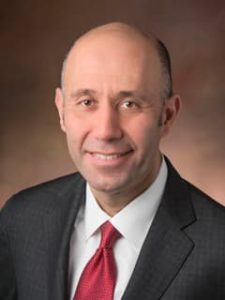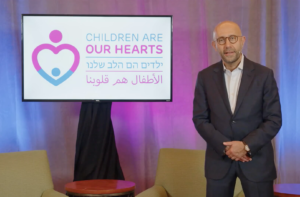
By Jon Marks
It’s going to be a big week for Dr. Jack Rychik of Merion Station.
On Oct. 23, he and his wife Susan will marry off the middle of their three daughters, Leora. Unfortunately, there won’t be much time for him to celebrate the nachas.
That’s because two days later he’ll leave for the United Arab Emirates capital of Abu Dhabi, the site of the inaugural International Middle East Fetal-Neonatal Cardiovascular Symposium on Oct. 28-29.
“I’m a pediatric cardiologist, also a native Israeli who came to the U.S. as a child, and still have family there,” said Rychik, director of the Fetal Heart Program and associate chief of cardiology at Children’s Hospital of Philadelphia. “There are centers around the world that do what we do. CHOP has a global health department. We go and offer lectures at various meetings around the world. The Abraham Accords opened my eyes to this possibility two years ago.”
The Sept. 15, 2020 signing of the Abraham Accords normalized relationships between the U.S., Israel, the UAE and Bahrain, opening the doors for diplomatic channels. Not long afterward, Oman and Sudan joined the party.
From there, officials at CHOP, led by Rychik, as well as the Schneider Medical Center in Israel and Sheikh Khalifa Medical City in Abu Dhabi, began laying the groundwork for what they hope will become a regular occurrence.

“In my 30 years, the pediatric cardiology field has advanced more into prenatal care and developed a lot of new techniques,” explained Rychik, the son of Polish Holocaust survivors and a member of Lower Merion Synagogue. “During pregnancy, it’s an area in medicine that crosses both pediatrics and obstetrics.”
“We can now perform an ultrasound and detect birth defect within 13 weeks, which is the standard for how the heart is formed. I started thinking this might be an opportunity for us to share our knowledge and see if we can collaborate with the center in Israel and welcome centers in the Middle East where we can develop a network.
“I was able to convince our leaders at CHOP to do a couple of things to spread our knowledge of how to care for these individuals. By doing so, it’ll be a catalyst for improving relations between Israel and the Arab world.”
That’s where CHOP Vice President of Global Strategy and Business Development Ruth Frey comes in. She’s hopscotched the Middle East, serving as the symposium’s chief liaison.
“After the Abraham Accords were signed, we hosted an event at CHOP on July 21, 2021, and invited diplomats from Israel and the UAE virtually but had the UAE consulate from New York there in person,” she explained. “The response was overwhelming, and we put the gas to the pedal after that. It takes a year, between planning the location, speakers and driving the money.”
Much of that money has come from anonymous donors, including a prominent member of the Jewish community, she said. For those wishing to contribute, CHOP has set up a donor relations line at 267-426-5332 or through [email protected].
With the preliminaries completed, the moment of truth will soon be at hand. For Rychik, it’s about more than spreading the word: It’s personal.
“As a child of Holocaust survivors, the importance of Israel and its value has always weighed heavily in my life,” he said. “All the more this history motivates me specifically to do what small things I can to make a difference.
“Even a small course correction like this — simply bringing medical experts from Israel and the Arab world together in the same room to talk medicine and discuss and learn about how to advance fetal and pediatric health care in a small domain of fetal cardiovascular medicine — may have a great impact as we move forward in time.
That’s why he, Frey and 15 of their colleagues — some of them Jewish — will board that 13-hour flight to Abu Dhabi, where they’ll interact with Arab participants in person and virtually. Despite opposition from Saudi Arabia and other Arab nations, the conference will go on.
“Recorded greeting from Isaac Herzog, president of Israel, and the UAE minister of tolerance will open the conference,” Rychik said. “There will be virtual registrants from India, China, South America and other countries.
“This kind of international conference happens all the time. Hosting it in the Middle East is a totally different thing. Thanks to the Abraham Accords, our hope is we can make it a sustainable thing.
“Maybe next year in Jerusalem, as we say.”
Jon Marks is a freelance writer.


